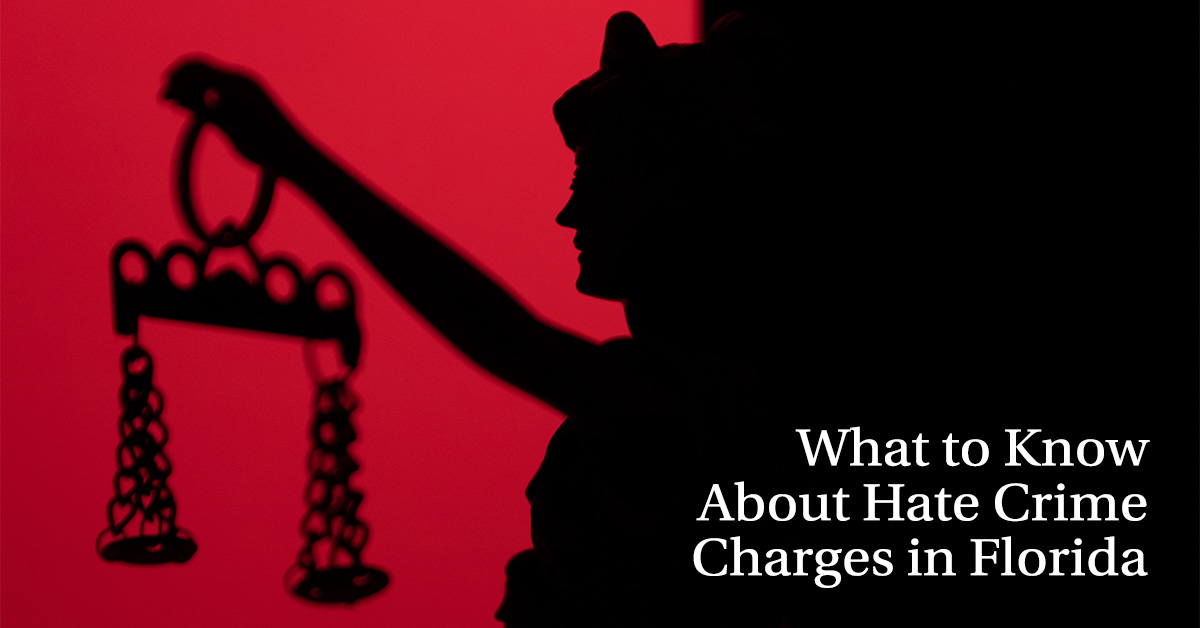What to Know About Hate Crime Charges in Florida

Most criminal offenses covered by Florida statutes are somewhat easy to understand. In general terms, people can usually explain what the crime is when someone is charged with murder, manslaughter, assault, kidnapping, arson, and many other offenses. However, some crimes may be difficult for people to define clearly. “Hate” crime is one such offense. Many people might correctly describe it as a criminal act committed with hateful intent. Most have difficulty detailing how hate and its use with intent are addressed under Florida law.
With more than 20 years of criminal law experience, Zachary Ward at Tallahassee-based Cowhey + Ward Attorneys at Law can help you understand how Florida defines hate crimes and how charges are laid under the law. Know that when any charged offense in Florida is upgraded to a hate crime, it can significantly increase the penalties handed down upon conviction. Thus, if you’re facing potential hate crime charges, you should always seek the legal counsel of a skilled criminal defense lawyer.
How Does Florida Characterize a Hate Crime?
The coverage of Florida’s primary hate crime laws are under Statute 775.085, evidencing prejudice while committing offense; reclassification, and 775.0863, evidencing prejudice while committing offense against person with mental or physical disability; reclassification. The key word in these statutes is “reclassification” because they reclassify felony and misdemeanor crimes to a higher-level offense if committed with prejudice (hate) against a distinct class of people as identified by:
- Race
- Color
- Ancestry
- Ethnicity
- Religion
- Sexual orientation
- National origin
- Homeless status
- Advanced age (over 65)
- Physical disability
- Mental disability
Thus, if you have been charged with battery and prosecutors believe they have evidence proving you committed it due to bias against the victim based on one of the above identities, they can reclassify the charge as a hate crime assault. This turns a second-degree misdemeanor into a first-degree misdemeanor, which carries harsher penalties. The lower-tier misdemeanor carries a maximum sentence of 60 days in jail and/or up to six months of probation and a $500 fine. Adding hate to the equation makes the maximum penalty one year in jail and/or up to 12 months of probation and a $1,000 fine.
This reclassification goes up the offense classification line, with penalties getting increasingly harsher. When hate turns the first-degree misdemeanor into a third-degree felony, the maximum sentence rises to five years imprisonment and a $5,000 fine. A hate reclassification to a second-degree felony carries a maximum of 15 years imprisonment and a $10,000 fine. Getting the first-degree upgrade carries 30 years and a $10,000 fine. After that, you’re looking at a maximum life in prison sentence.
The bottom line is that hate crime charges significantly increase your legal jeopardy. The penalties are not necessarily limited to what the criminal courts can sentence. The statutes also allow victims to sue for triple damages if they take civil action against you. And if you’re convicted of criminal hate charges, your victim will likely achieve success against you in civil court.
How do Prosecutors Prove Hate Crimes
To prove a hate crime, prosecutors must prove that the defendant committed the related offense. Prosecutors must also prove that the defendant was aware that the victim was a member of one of the distinct classes and was primarily motivated to commit the offense due to that awareness. Other motivating factors behind the crime, such as monetary gain, may mitigate evidence used to prove hate.
In trying to establish hate as the motive, police and prosecutors will assess numerous factors and evidence connected to the defendant, including:
- Nature of the offense and how it was instigated.
- Verbal statements made during and after the crime.
- Potential affiliation with extremist groups.
- Communications on social media or other platforms.
- Activities taken before the offense.
- Indicators of relevant hate during the commission of the offense.
- Clothing, tattoos, or other indicators with extremist or hateful symbols and words.
- Other motivating factors or lack thereof.
Proving motivation is subjective, so prosecutors need to find as much evidence as possible to link the crime with the defendant’s alleged hate for the victim’s specific class of people. Cruel words or explicit slurs projecting distinct prejudice against the class usually won’t stand alone as evidence. It can lead to conviction when combined with other indicators of bias.
Turn to Cowhey + Ward for Your Criminal Defense
If you or a loved one is facing hate crime-related charges in Leon County, consult with the criminal defense lawyers at Cowhey + Ward. Hate crime charges significantly increase the potential legal jeopardy. You must aggressively defend against these charges to secure a favorable outcome. To learn more about Cowhey + Ward’s criminal law experience, contact our Tallahassee-based office today at (850) 222-1000.
Accessibility Statement
Our firm is committed to keeping our site accessible to everyone. We welcome feedback on ways to improve the site’s accessibility.
